- Home
- Marilyn French
My Summer With George Page 2
My Summer With George Read online
Page 2
For if there’s one thing I can’t stand in people, men or women, it’s a posture of control. People who act as if they have themselves and the situation completely in hand tend to take over every situation, take you over as if you were a child. Whenever I’m around someone like that, I tend to drift away—physically if I can, mentally if I can’t. The appearance of total control is appealing only in fairy tales—adventure or military stories or romances, written or cinematic. In the make-believe world, people can have total control: the story makes it true. But in life, no one can possibly have total control. People who pretend to it are pretentious and fake, and I loathe them. You adore the hero who assumes control in the movies, because he really has the supernatural powers he claims: the movie gives them to him. Only godly power can make control bearable, can redeem it, and godly power is found only in fiction. George’s obvious lack of control—his flustered manner, the discomfort he could not or did not try to mask—deeply appealed to me, a person whose social graces, painfully acquired over the years, conceal scars from self-inflicted wounds. So I challenged him with a smile.
“What do you mean, a hell of a house? A hell of a nice house or a hell of an awful house?”
“A hell of a big house!” he exploded, his head pivoting as he examined the ceiling, the staircases, the dining room, with its table that seated forty.
“Ah, yes, that it is.” I dredged up the usual question for breaking the ice at parties. “How do you know the Altshulers?”
“Don’t. Never heard of ’em. Who are they? Was that woman who grabbed me and dragged me over here an Altshuler?”
I laughed. “You sound as if you feel dragooned.”
“I don’t like being dragged—or dragooned,” he said grumpily, looking around him warily. He returned to me. His eyes began to focus on me. “I’m visiting Edgar Allen. The actor—you know him? We’ve been pals since prep school. He’s a hell of a good actor. Did you see him in The Little Merman? He was great. Terrific.”
My mind, as always when I meet someone new, was whirring with deductions. That he was socially uncomfortable was immediately apparent. He had a strange vocabulary—very enthusiastic and male and American, full of greats and terrifics and a hell ofs—the kind of language one hears from men who had problems learning to become men, who had had to learn how to speak something they consider the language of men, like boys who learn in prep school to call each other bro and invite each other to go out for a brewski. But since I had spent many years learning how to be a woman, I was not entirely without sympathy for such men. He sounded enthusiastic, sincere, and a little naive, like the open palm of a hearty handshake, suggesting good intentions, good wishes. His speech was the male equivalent of the lockjaw speech so prevalent among Connecticut matrons, or the gushing effusiveness of middle-class women in Atlanta or Charleston. I dislike fake tones of voice; I prefer voices that reflect reality, that reveal a bit of edge, bitterness, sorrow, anger. But George’s display of innocence and openness seemed to me self-protective, masking and deflecting attention from the intensity that showed in his piercing eyes and the tiny, tremulous lines around his mouth. And those drew me mightily.
He’d gone to prep school. I always note class markers. That meant he’d probably prefer light chat, meaningless conversation. Most men liked to talk about sports—it was the only dependable subject, actually, with men—but I had cultivated an ignorance of sports as carefully as men cultivate knowledge of them, and I could not converse in that language. Politics was tricky, since one never knew, and I take politics too seriously to discuss it lightly. Money is a boring subject, and I refuse to discuss it or its markers—cars, houses, boats, acquaintance with Alan Greenspan or David Geffen. So all that was left was persons or the arts. Persons was safer.
At this point, I had merely a certain sympathy for and interest in George Johnson, a little quickening of attention, a heightening of the hormones, and it was easy enough for me, with my long, self-conscious training in party conversation, to extract the relevant facts about him. He’d been born in Louisiana but now lived in Kentucky and edited the Louisville Herald. He was, it seemed, in his mid-fifties (god, he looked good), and he was not married and did not appear to be gay. And—wonder of wonders in a man—he asked me questions about myself! I was always vague about my distant past and, if pressed, would lie about it. But I didn’t need to lie about the past thirty-odd years. For that period, my record was socially impeccable.
“So you’re a writer?” he exploded. “And you write novels! God, I respect that! I edit a first-rate newspaper, but I’ve always wanted to write novels. You know, in novels you can tell the truth about things. You can’t do that in a newspaper, not really. You can tell certain facts, but not the truth. Well! That’s great!”
I could be wrong, but I believe that around this point, his glance became a little brighter, he peered at me with more interest, even some intensity. Strangely, his way of speaking contradicted his appearance: his language suggested someone burly, muscular, red-faced, outgoing, his hand extended to greet every stranger; not a lanky, pale, delicate-limbed, slightly potbellied man.
“And I envy you your work. How thrilling to edit a newspaper! I would love to do that in my next life.”
“Do it in this one. Come on down to Louisville, and I’ll give you a shot.” A half-smile played around his mouth.
It had been a long time since anyone had flirted with me, so long that I could not be certain that was what he was doing.
“That would be fun,” I said, smiling back at him with a certain glint.
“Be great. We’d have a ball. Show you the town.” His eyes glittered unmistakably. At least, I thought it was unmistakable. But then he looked around uncomfortably.
Time to backtrack, perhaps. I looked around too. “Is there someone here you’d like to meet? I know almost everyone,” I offered.
He brought his eyes back to me. “Somebody said Ellis Porter was here. God, I respect him! That book of his on the CIA, that was great stuff—he really probed for that book, he broke all the taboos. I tell you, that book made him a hero of mine!”
“Yes, he is.” I searched the room, finally spotting Ellis near the bar, talking to Martin Samuels, the publisher. From the look of them, this would not be a good time to interrupt them: Ellis was speaking intensely, and Martin was riveted by him. They looked as if they had just discovered mutual passionate love, although neither had previously shown inclinations toward the same sex.
“We could meander toward the bar,” I suggested to George. “He’s over there engrossed in conversation, but we could wait until they finish.”
It took some time for us to get to the bar—the room was still crowded, although the party was several hours old. But Ellis’s voice reached us even before we reached the bar.
“Fucking goddamned liar told me I was getting the highest advance any journalist had gotten since Woodward and Bernstein, and I believed him—fuck, you believe your agent!”
Martin raised his hand. “Listen, it was a damned respectable advance, Ellis! I don’t know what Billy told you, but the advance was the best we could come up with—we worked the figures. I don’t like to go into all this, it’s so unpleasant, but your last couple of books didn’t do all that well…”
Ellis’s face was deep red. He seemed to be exploding and I feared he would have a stroke. “What kind of promotion did you give those books, Samuels, just how much did you extend yourself for them, huh? You didn’t get me a Time interview, you didn’t get me the Today show…”
“We agreed on an advertising budget of a hundred thousand, Porter, and we abided by that agreement. We can’t deliver major media, you know that, they’re independent…”
Both men were yelling now, drawing the attention of half the room. I glanced at George: he was staring at them, open-mouthed. “Would you like to see the gardens?” I asked.
He nodded.
As I led him past the arguing men, Leo Altshuler stepped in between them, put
his arms around them, and whispered something. But Ellis yelled even louder and smashed his glass down on the bar and stalked out. Martin stood transfixed. We moved toward the glass doors and down the terrace steps. We paused at each level while I pointed out the flowers growing there, the ones whose names I knew, anyway. We reached the dock. A breeze had sprung up. It had apparently sent everyone else indoors, but I found it refreshing.
“Ah, what a wonderful breeze,” I murmured. “Would you like to sit here for a moment? Or is it too chilly for you?”
He looked at me blankly, as if he didn’t know what chilly meant, or didn’t feel anything at all and so didn’t understand my statement. But he plopped into one of the gleaming white canvas deck chairs Janice kept on the dock. I sat in another.
“My god!” he said. He was quite pale.
“Sorry you had to hear that,” I said. But then I burst out laughing. “And to think I thought they were making love! I should have known!”
“Love?” George repeated, horrified. “Love?”
I shrugged. “Pitching woo. You know.” I giggled. “They seemed so passionate.”
“And here I thought he was such a great guy, a great journalist!”
“Well, he is. A great journalist.”
“All he cares about is money. How can he be a great journalist? He’s destroyed my respect for him, I tell you that!”
“He was just talking about money at that moment. He cares about lots of other things. Writers get crazy on the subject of money. It’s an occupational hazard. They work alone, the loneliness gets to them. They develop fantasies about other writers—who’s earning more, who gets more publicity, sells more books, is better known. Money is the only scorecard. Don’t be dismayed. Ellis is a decent man. I’ll introduce you to him another time.”
George shook his head. “No, thanks. Umm-umm. No.” He kept shaking his head. Suddenly, he stopped and stared at me.
“You do that? Get crazy about money? Yell at publishers?”
“I’ve done my share of yelling in my life,” I confessed, smiling, “mainly at incompetent cabdrivers, parking lot attendants, and other petty obstructionists. I’ve never yelled at a publisher, and I’ve never yelled about money—that I can recall. But I can imagine doing it, if I were…anxious enough.”
He was listening to me as if what I was saying really mattered to him. “I never heard anything like that in my life. Never. That was terrible.”
I examined him with some interest. Tender soul, I thought. Better he should stay in Louisville.
It was then I realized I had already been imagining him moving to New York.
During the next hour, as George and I sat on the dock, he regularly exploded with enthusiastic invitations. Three or four times, he urged me to come to Louisville to enjoy its cultural glories, especially its theater. He invited me to the local summer theater that evening, to see Edgar in (what else?) Our Town.
“He’s the narrator. He’s really fabulous, he’s great! You should see him!”
When it became clear that I did not intend to take him up on this, he fell silent. But only a few moments passed before he announced enthusiastically that at least I should see Edgar’s garden. “You’re interested in flowers, and he has a great garden—I don’t know the names of anything, but he’s a real gardener. His garden’s not as big as this one, of course. But it’s nice; you’d like it. I could show you the garden, then we could pick up a hamburger or something. I really want to get out of here; I don’t like these people.”
As the Altshulers’ weekend guest, I would have been committing a social gaffe to leave the party, especially with a complete stranger. Moreover, I knew that for Janice Altshuler, the best part of a party was afterward, when a small group of trusted friends would sit around the living room having high tea—lovely little finger sandwiches and scones and oozy cream cakes, tea or coffee—and rehashing it. We all reveled in the new gossip, evaluating the clothes, the food, and any behavior that was in the least bit unusual. Tonight we would probably have to skirt the main bit of gossip—Ellis Porter’s terrible breach of decorum—since he would be there. But if he had already decamped in shame, there would surely be an orgy of gossip. For me to defect from that crucial after-party session would be as close to unforgivable as any sin in the Altshuler catechism. Only a death in the family could excuse it.
But George had no idea of any of this, since I smiled in pleasure with each invitation, even the repetitions of invitations, as if I was taking them seriously. Indeed, I was: I took them as expressions of George’s desire to see me again. This delighted me. Words kept running through my head: that there would be time, there will be time…“time for you and time for me, / And time yet for a hundred indecisions…”
Smilingly complacent, I sat gleaming at him.
He finally gave up, fell silent, and stared at the water with a furrowed brow. It was after six, and the sun was slowly lowering itself into the water, which was brilliant with reflected color. Suddenly, he turned and announced that if I couldn’t come tonight, I absolutely had to visit the garden the next morning. Edgar would be home until he left for rehearsal for next week’s play (Harvey, of course) at about eleven. George would be there until around noon. It was urgent that I see this garden.
But guesthood has unbreakable rules. Whenever I stayed overnight at the Altshulers’, I returned to New York the next morning with Leo in his limousine. Leo looked forward to these sessions, the only times we were alone together. Although we always chatted easily enough, he never spoke personally during these drives. But I knew he felt they were our private times for communication. When I got out of the car at my apartment (he dropped me uptown first, then drove downtown), he would clasp my hand with particular fervor and kiss my cheek with special warmth. I could not abandon him.
“He always leaves at eight o’clock in the morning,” I apologized. “He goes in every day. He’s retired, but he has his hand in everywhere. He’s on boards.” That was all Leo did, as far as I knew. “I serve on a lot of boards, Hermione,” he’d told me. I gathered that he—that some people—made money from being on boards. How, I didn’t understand. The few boards I’d been on took up huge amounts of my time and money. They never paid anything.
“New York! You’re going to New York?”
“Yes. I live there.”
“Huh! I thought you said…what did you say? Didn’t you say you lived in Bag Bar or something?”
“Sag Harbor.” I laughed. “I have a summer house in Sag Harbor. That’s on Long Island. But I have an apartment in New York too, and that’s where I’m going tomorrow.”
“Well, say! The reason I’m here, in the North—I just came to Connecticut to spend the weekend with Edgar—is to attend a conference of newspaper editors at Columbia, an international seminar. It lasts all week. So I’ll be in New York too!”
His furrowed brow had smoothed; he seemed quite cheered. Eyes glittering, he gazed at me with a broad smile.
“How nice!” I glowed back at him. “So where are you staying?” I asked casually.
Columbia was putting up the participants in university housing, he wasn’t exactly sure where. “Say”—he pulled out a notepad and a ballpoint pen—“give me your phone number and address, and maybe we can have lunch or something.”
Edgar appeared behind George’s chair. “Have to be off, old man,” he said, “grab a bite before show time.” He turned to me. “Say, Hermione, bunch of us’re going to Donnelly’s for a hamburger before the show. Want to come?”
“Yes, come!” George urged, standing.
I stood too. “Thanks, but I can’t. I really can’t.”
“Bring the Altshulers,” Edgar urged. Perhaps he knew their rituals.
“They’ll be tired. They won’t want to go. But thanks.”
George stood there like a demand. “Ask them. Hell, I’ll ask them! It’ll be fun,” he insisted.
“Please don’t!” I held up my hand. I could imagine his importunacy swaying J
anice to agree, thinking it was important to me, then resenting it afterward, resenting me, mourning the loss of the after-party gossip session, giving me the third degree about him, not all that pleasantly…
I just shook my head. “Sorry. It would be fun, but…”
“Well, all right.” George turned away reluctantly. “I’ll call you in New York,” he said.
The two men walked up the steps toward the house. I watched their silhouettes, one tall, one short, in the dusky light. They were talking in low voices, and their heels clattered on the stone terrace. They walked around the back of the house to the side lawn, headed for the parking area, and disappeared.
I sat down again and watched the water. Little caps of foam appeared as the breeze grew stronger, roiling the water, turning the calm Sound into a miniature ocean. It was exciting to watch, like seeing passion arise from tranquillity.
2
I LAY IN BED that night unable to sleep after the hashing-over session. Gossip is stimulating, and raking poor Ellis Porter over the coals (he had left early) had been especially so. We’d laughed ourselves silly. And I’d eaten too many sandwiches (they were delicious, and so tiny I gobbled them up without counting) and drunk too much coffee. Janice said it was decaf, but can I trust her? The food, the coffee, and the conversation all contributed to my insomnia, but the content of my awakeness was George. I couldn’t get him out of my head. His urgency, his importunacy—it had been many years since a man had acted that eager, that demanding toward me. I tried to recall the last man who had pursued me, pressured me that way. Were any of my husbands that insistent? That doctor in Colorado, the one with the Jeep—he’d been really pushy. And the famous Greek movie director I met at the Opera in Paris, whose name I could never remember. There had been others, but not in years, not since I’d hit my middle fifties. My experience with sexual pursuit had been unsettling: by the time I got used to men pursuing me, I was in my late thirties, when they were just about to stop. It didn’t seem fair, somehow.

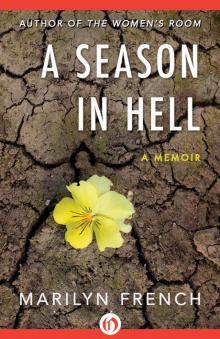 A Season in Hell
A Season in Hell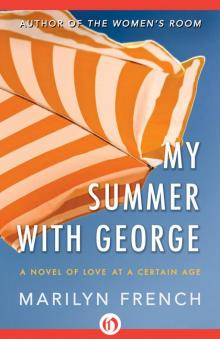 My Summer With George
My Summer With George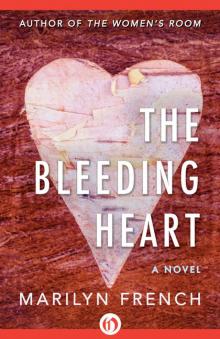 The Bleeding Heart
The Bleeding Heart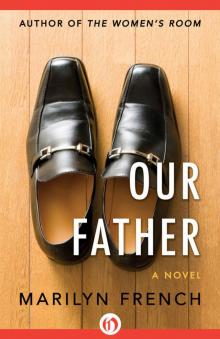 Our Father
Our Father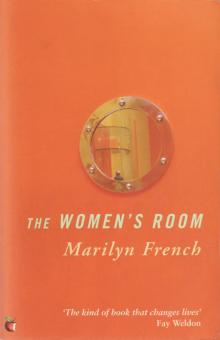 The Women's Room
The Women's Room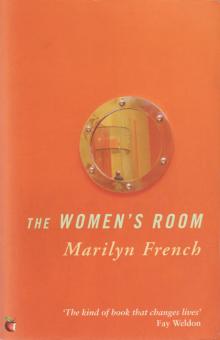 The Women's Room (Virago Modern Classics)
The Women's Room (Virago Modern Classics)